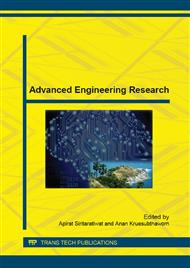p.632
p.637
p.643
p.647
p.651
p.655
p.659
p.663
p.667
Forecasting of Production and Consumption of Ethanol in Thailand Using Time Series Analysis
Abstract:
Ethanol is the important renewable energy in Thailand. It is alcohol produced from sugarcane and tapioca that are agricultural products available in Thailand. Ethanol is used to blend with gasoline for use as gasohol. Ethanol production and consumption in Thailand are fluctuating. Consequently, planning of ethanol production and consumption is irrelevant. In order to solve this problem, this study aims to find forecasting models using time series analysis including exponential smoothing and the Box-Jenkins methods. The most appropriate forecasting model was selected from the two methods by considering the minimum of the mean absolute percentage error: MAPE. It was found that the Box-Jenkins is the most appropriate method to forecast both ethanol production and consumption. The forecasting results were then used to determine appropriate quantity and proportion of molasses and tapioca needed for ethanol production in the future.
Info:
Periodical:
Pages:
651-654
DOI:
Citation:
Online since:
August 2015
Authors:
Keywords:
Price:
Сopyright:
© 2015 Trans Tech Publications Ltd. All Rights Reserved
Share:
Citation:


